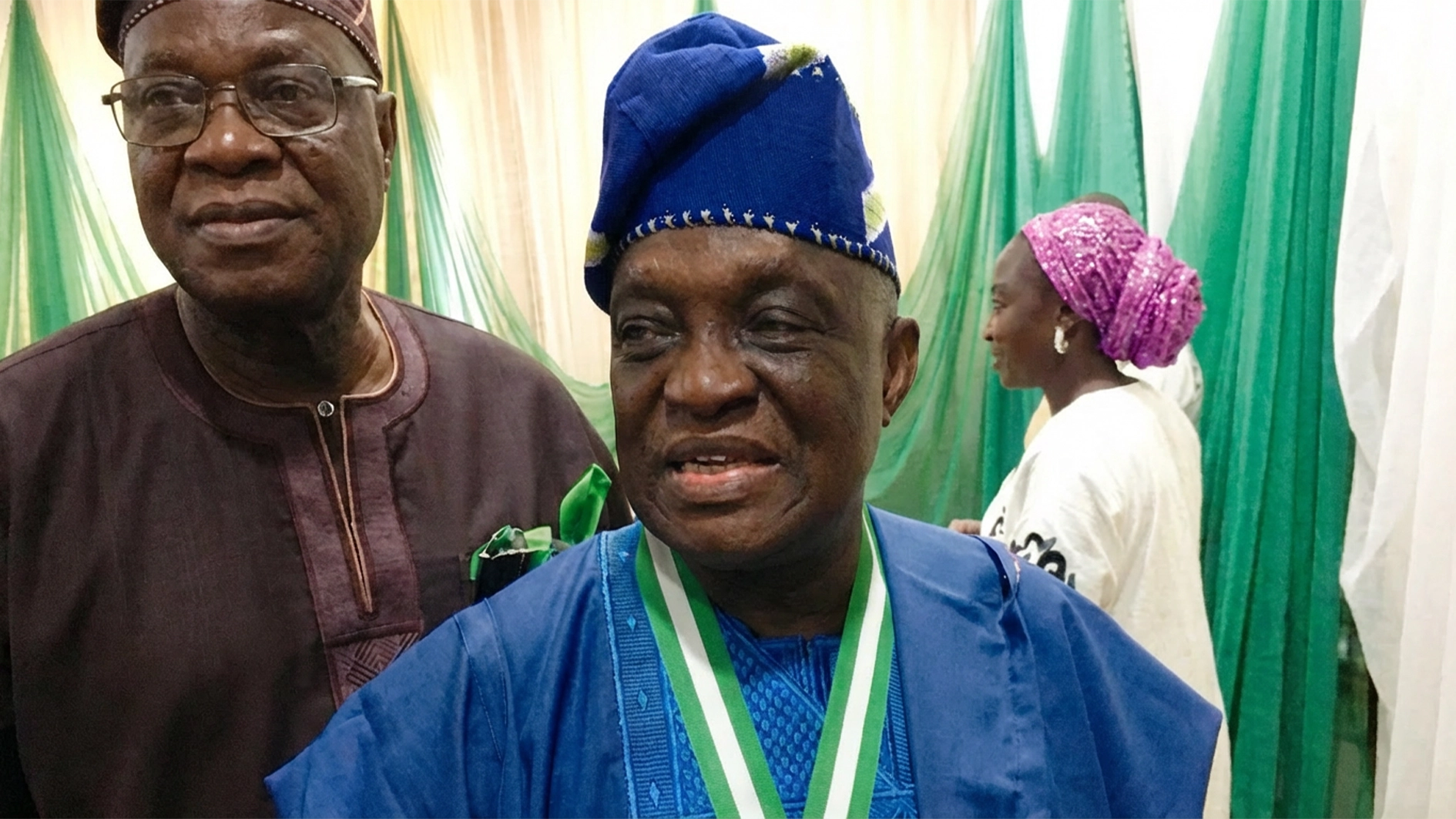
I am yielding my column today to Professor Mabel Evwierhoma’s discourse on Professor Olu Obafemi, who can and will always be counted among the famous enlightened playwrights, dramatists, poets and writers of your country my country our country and of our age.
All lovers of literature and the growing number of readers of this column will find this discourse a welcome sort of Olu Obafemi the great personage and scholar-artist whose national and humanistic concerns are as broad as the sky.
Happy, happy reading, dear, dear readers as your remarkably further and abiding interest in Nigerian literature and its progress will be further rekindled now.
Pertinent to this discourse on Professor Olu Obafemi is his play Pestle on Mortar. Suffused in imageries connected to womanhood, the play proves a dominant point that Olu Obafemi remains in sync with his mother as the biological source and another female essence of fecundities. Omo Kirii, Omo Ajon, Omo Ogidi, I salute you in reverence. Obafemi reflects:
An attack against failed morality either at the marketplace or community evident in Near and Distant Cries Reversed reality using immoral political elite and corruption evident in Suicide Syndrome;
Societal Expectations in Ajon! and Running Dreams;
Subversive reconstruction of culture in Nights of a Mystical Beast;
Cold-hearted governance immune to the cries of the led in Scapegoats and Sacred cows;
Obafemi’s fixed contract with his readers and audience since his first play Nights of a Mystical Beast;
Activism and social interventions evident in all his plays;
His personal approach that exudes the development and building of individual destinies that otherwise would have remained in oblivion;
Etc., etc. several ellipses about this great man.
Obafemi’s predetermined approach is one of a dramatist as the determinant of human capital progress and development. It is imperative to note that a writer is a harbinger of prospective events. What potential he envisions is encapsulated in characters that bring them to pass through the play’s plot, characterisation and dialogue.
The futures include a covenant with women’s engagement for nation-building despite tensions from inaction. What happens when a pestle is on the mortar? What are the connotations of a pestle resting on a mortar? Here Pestle on Mortar accrues creativity, activism and enunciation to women’s response to a variety of issues. The pestle is akin to a machine or a food processor and should be in the mortar in anticipation of work, to generate or process food for sustenance. It is a dominant tool in the kitchen, where collaboration and joint action by different implements pursue one major outcome: food on the mat or table.
The domestic arena or any space for food processing enjoys the dominance of the mortar and pestle where alimentary issues are at stake. One cannot work without the other. This is evident in the mortar’s capacity to bear the pestle at work, play, or rest.
A pestle on mortar denotes a context of idleness, rest, or accomplished tasks after work is executed. Therefore in the text, who accomplishes and who benefits? Within the Nigerian polity, a lot of issues stand on their head, in reverse of logic, morality and contexts that build rather than destroy. One can attest to the pestle being on the mortar, a state of inertia, arising out of disjointedness. Both mortar and pestle are co-workers, concerted producers, or co-labourers on the field, like the anvil and the hammer.
The pestle is fabricated to pound, and grind, a tool for reduction, pounding whole, insurmountable heaps to bits and fineness. At other times, one mortar is home to two or more pestles, for accelerated production. This wooden receptacle is a receiver or bearer of energies from the pestle(s). Ages ago, it was highly dependent upon where there were no electrical time and labour-saving devices or mills to process food or raw materials like removing husk from grains before they were winnowed. This rustic means of getting food for subsistence is still relevant. Mortars and pestles also feature in the apothecary’s shop to grind and compound medicines.
In street parlance, the mortar also features in some tool sheds, like the car mechanics.’ When a car is stood on a mortar (O go ri odo), it is dormant, without wheels for locomotion and stationary, signifying prospects for repairs, or even end-of-life. In the era of post-Ebola, COVID-19 and other diseases or mental health issues or dis-ease, it is plausible to demand that the pestle should remain in, and not on the mortar. What then should the mortar crush to obtain the desired product, outcomes and effects?
Olu Obafemi’s play takes a title from the woman’s dominant domain or a domestic ground where the kitchen features. The cover blurb of the play informs the reader of the material and symbolic context of wood or its products as a crucial device. The pestle is the crusher, and the mortar is the receptacle of the matter to be crushed. Both need to be strong and not easily worn out, given the dependence on it by humanity. This writer is witness to mortars and pestles that have inter-generational status and crossed many mother-daughter and mother-in-law and daughter-in-law generations, having tales of forebears and successors to narrate. She can also buttress the fact that the pestle is many a woman’s instrument of household or conjugal attack and defence, a post-feminist approach to household and relational ethos.
Now to the highest education constituency, the Nigerian University system, that cannot be glossed over. The mortar is the receptacle of knowledge, and the pestle is the apparatus of power. Inherent within it are the different schools of thought be they radical, conservative, proactive or reactive in the approaches to analysing the near indifference to the citadels of thought.
Education is central to the development of societies, whether it is formal, informal, technical or vocational. Whatever comes its way, the mortar holds and grinds. In the same manner, the university receives for winnowing, fresh minds that eventually become polished. Pestle on Mortar was written as an undergraduate, when Obafemi in 1974, considered a neophyte, wet behind his ears then, but now a renowned philosopher-dramatist in his approach to national and humanistic themes. His works in the area of cultural administration continue to speak and remain reference points in the sector. He has certain things in common with many that he has foregrounded: Children of commoners can make it if the university system remains built on merit. Like the hawker’s son, this writer is that widow-clerk’s daughter who standing on the shoulders of giants like Obafemi has been helped to engage with futures.
Let’s conclude by asking and answering thus:
Has Obafemi delivered? Yes and No.
Yes: Plays constantly in asking governance, and leadership to be accountable to people.
On a personal note, he remains a builder of men and women.
No: he is also a man who though in government, has not been fully appreciated by his values, contribution and mediation in the industrial crisis within the academic sector.
Now the columnist must note and add adequately that what Professor Mrs. Mabel Evwierhoma, a feminist Professor of Theatre Arts, University of Abuja, has done to one of Professor Olu Obafemi’s earliest plays here is a curious introduction that is more than a curious introduction of Obafemi and his curious feminist sentiments to a significantly large percentage and population of readers.
As a playwright and dramatist herself who relishes feminism as a healthy humanistic concern, Lady Mabel Evwierhoma is comfortably swept off her scholarly and artist feet by the national and humanistic feelings and concerns of Obafemi, a master she cherishes, without qualms, for this society and beyond it.
To understand Olu Obafemi’s oeuvre, and artistic vision, ultimately, one perhaps should begin or ought to begin with a reading and high study of Olu Obafemi’s Pestle on Mortar whose conceptions of feminist thought and activism extend and expand to political participation, education and culture toward a very radical social change, the type that your country my country our country urgently needs now. There should be no doubt about this. Or is there?
Afejuku can be reached via 08055213059.






